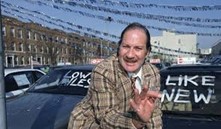
Watching retailers do their own commercials on TV often makes me cringe. Particularly car retailers. They start their commercials by yelling and keep it up.
Their theory may be that all their energy makes the viewer think that something exciting is going on. But is just yelling enough?
The result is a constant yelling throughout the commercials. And sometimes, unintelligible claims and promises all shouted out like a barker at a circus side show.
One thing we know about providing vocal emphasis is that it comes from a change – a change in tone or volume. Drama comes from elevating the level of delivery, not from sustaining it.
A change of vocal pitch creates more emphasis – and, excuse the pun, a much better sales pitch.
But here’s the trick. To be able to use your voice to create that kind of emphasis requires some skill or natural talent for voice acting. Something that most retailers do not have. And why should they?
If they had that kind of acting skill, they might be actors themselves. Their presentation could benefit from some solid guidance from a Director. But are these guys ready to accept direction? Most are successful and believe their own PR.
We did a blog a few years ago that shows the folly of thinking that business owners accepting direction from an outsider might happen. It was called “What’s More Important, Your Business or Your Ego?“ More often than not the ego is more important than sales.
Over the years, we have done many commercials, okay hundreds of commercials, with retailers who wanted to voice their own commercials, or retailers that we thought could do a good job at voicing their own commercials. By and large, the commercials that worked best were the ones where we thought the retailer was capable of voicing the commercials and would accept some help and direction in this unfamiliar role.
Was this because we are casting geniuses? Not really.
When we as outsiders made the suggestion, the retailer more often (hopefully) looked to us for direction and help. They came with a little humility and recognition. With an outside guide helping them to create the voice required, there were better odds that the end result would be better.
An outside critical voice, a second opinion, helps create an unbiased view of the end communication. A feedback loop. And that critical assessment really helps overcome any “ad-versity”.
This is the same reason I have told many people that writing maybe hard, but editing our own material is even harder. If you can’t self assess your work and be critical, you are left with your ego running wild and yelling at everyone to get attention.
When writing #Overcome AD-versity, I had at least four outside experts read the book before it went to press. They gave me feedback that improved the book. Sometimes I didn’t agree, but I always listened and thought about the comments they whispered in my ear.
Sometimes a whisper can be the loudest voice in the room. And yelling can make you just look like that barker at a side show – not a highly credible authority the customer would want to deal with.